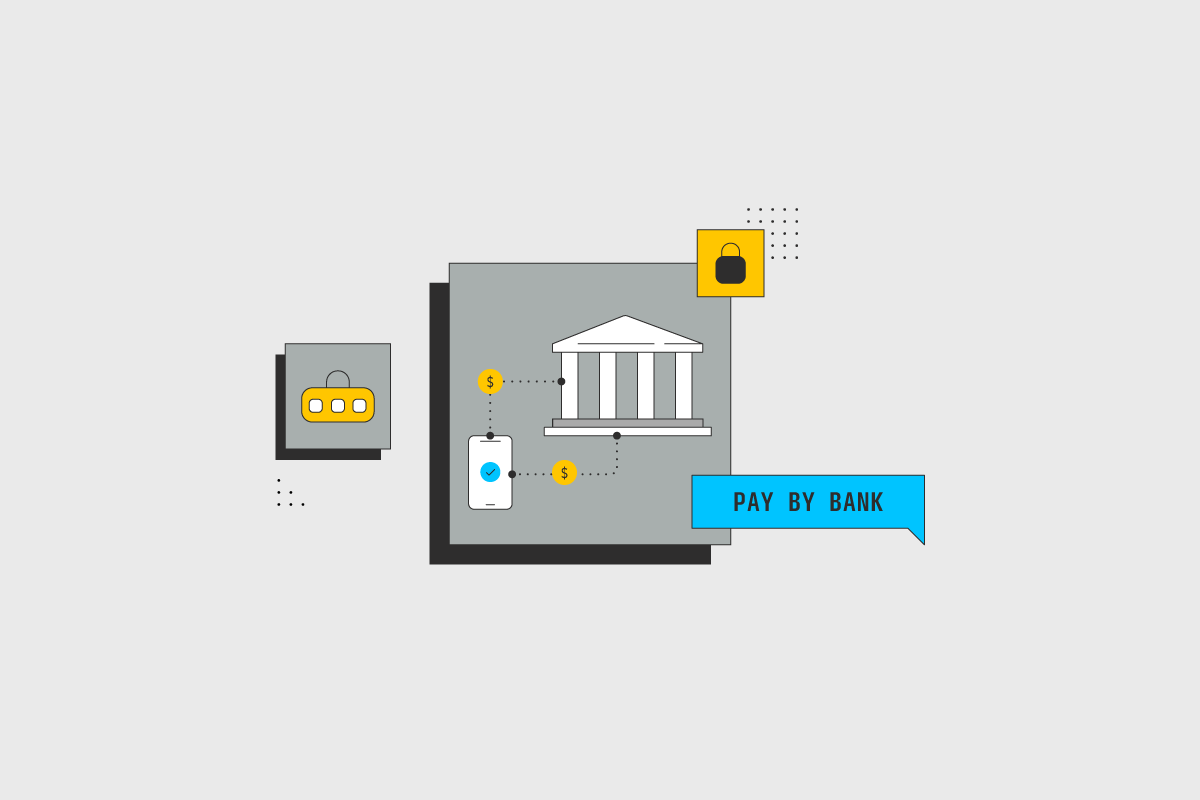Blog
Safest way to pay online: Pay by bank
March 24, 2023
Editorial Team

Safeguard your transactions: why pay by bank is the safest way to pay online
It’s never been a more important time to stay safe and secure online. Your data is collected and shared by most websites you visit and applications you use.
There are some regulations in place to try to give back control of how your information is handled, however, when it comes to paying online, there are still many risks involved and you should know the safest way to pay.
In this article, we’ll cover what pay by bank is, why it’s important to make sure you’re using secure payment methods, and how to use pay by bank to make a secure online payment.
What is pay by bank?
Pay by bank is a secure payment method that allows you to make online payments directly from your bank account without using credit or debit cards, or sharing sensitive information. This is a relatively new payment method in the US as the technology enabling it only became available due to open banking.
The importance of secure payments
As our daily lives continue to shift online, it has become increasingly important to prioritize online security. The average adult in the US spends up to 8 hours per day on digital media, making it easier for companies to obtain personal information, thereby increasing the risk of online shopping fraud and identity theft.
In fact, recent data from the FTC showed that in 2021 alone, they received a staggering 2.8 million fraud reports, resulting in estimated losses of $5.8 billion, with imposter fraud and online fraud representing the largest two categories. Payment fraud has become more difficult to prevent and detect, making it imperative to exercise extra caution when making online payments.
Tips for staying secure when making an online payment
Below we’ve listed a few tips to keep in mind when you’re about keeping your payment information safe online. Whenever you have to enter shipping, billing, and personal information you should expect the system to be secure and prevent fraud.
Check the URL
Always check the URL of the website to make sure it’s the official site. You may see security features such as “https” before the website name. This means the website you’re on has a digital certificate that’s encrypted and used to secure data that is being transferred from you to the website.
Check for security seals and badges
Look out for icons such as the padlock in the browser at the top before the URL and “PCI DSS” and “Norton Secured” logos. Prominently displayed security badges and seals may show you that the platform takes safety seriously.
Too much information
If the company is asking for more than basic payment information then you may want to double-check before making any online payments or transferring money. Your name, shipping, billing address, and cell phone number are more than enough customer data the company needs.
Contact the company
If you’re not sure about the payment page, take some time to look around each part of the page to check for its legitimacy. You can reach out to the company through their contact page or social media channels.
Any legitimate company will be more than happy to answer your questions, especially if you’re concerned about fraudulent transactions. If you can’t find these contact details, then the company is either not legitimate, or you’re on a fake website.
Traditional payment methods online
Most popular online payment methods being used today in the US
You will be familiar with credit and debit cards and digital wallets such as PayPal. But did you know the risks that comes with these when making online payments?
We’ll take you through the three secure online payment methods and break down the use in the US and some helpful statistics.
Credit cards
Over 150 million Americans experienced credit card fraud in 2022. That’s almost half of all Americans and projected to exceed $12 billion in losses.
Examples of credit card fraud:
Identity fraud scams
Skimming scams
Credit card interest rate reduction scams
Phishing scams
Social security benefits scams
Government imposter scams
BIN Attacks
Digital wallet (digital apps)
Apple Pay, Google Pay, and PayPal are popular digital wallets in the United States. Both Google Wallet and Apple Pay integrate with your main Google or Apple account, making it easy to access your information from anywhere as long as you have your login information.
Examples of digital wallet fraud:
Social contest scams
Cash prize scams
Fraudulent payment scams
Overpayment scams
Fraudulent customer service scams
Debit cards
Debit cards are another popular online payment method in the US. Here are some common fraud tactics you may experience:
Clone or steal cards - Fraudsters use a physical card or a cloned card at an ATM to withdraw cash or a point of sale terminal at a store.
CNP fraud - Hackers can get into centralized databases or financial services through different methods to steal private information and then pay for things without having the card with them.
More secure with pay by bank
All payment services offer some level of security to protect users' data and prevent unauthorized transactions.
Pay by bank uses open banking technology which helps improve security for online transactions thanks to its use of SCA, bank-grade encryption, consent-based access, and no sharing of login credentials.
Strong Customer Authentication (SCA): Open banking requires SCA, which is two-factor authentication process that provides an additional layer of security beyond just a password or PIN. This makes it much harder for fraudsters to gain access to accounts.
Encryption: Open banking uses higher levels of encryption to protect your data. This is the same level of security that banks use to protect their own systems and data.
Consent-based: With open banking, you have to give permission to third-party providers for them to access your data. This gives you more control over who can access your data and for what purpose.
No sharing of login credentials: Unlike other payment methods, open banking does not require users to share their login credentials (e.g. username and password) with third-party providers. This reduces the risk of those credentials being stolen or misused.
Security Feature | Open Banking | Credit Card |
|---|---|---|
Transaction Authentication | Strong authentication required (e.g. biometrics) | Authentication via card number and CVV |
Account Access Control | Consumer grants permission to access data | Card issuer controls access to account |
Data Privacy | Data shared only with consumer permission | Data shared with merchant and card issuer |
Fraud Protection | Real-time monitoring and reporting of suspicious activity | Chargebacks and fraud alerts |
Payment Limits | No maximum limit set by open banking | Credit limit set by card issuer |
Consumer Liability | Limited liability for fraudulent transactions | Liability depends on type of card and timing of report |
Paying with pay by bank
Pay by Bank is also available to anyone with a bank account, regardless of whether you have a credit or debit card.
Making payments online with pay by bank is simple provided that the payment page you’re on gives you the option. Many companies are starting to add this payment option to their checkout so you can enjoy the speed, security, and simplicity of pay by bank.
How to pay using pay by bank
Here is how you make payments in three simple steps:
1. Connect to your bank through a simple and secure sign-in flow.
2. Select the account you would like to use.
3. Once a payment is successfully initiated the payment processor moves the funds.

Final thoughts
Finding ways to keep your hard-earned money safe can be confusing and scary. Our aim at Link Money is to make payments simple, secure, and fast, and we believe that pay by bank is the most secure way to make a payment online.
If you would like more information about payment processing and our services, feel free to reach out to us at any time.